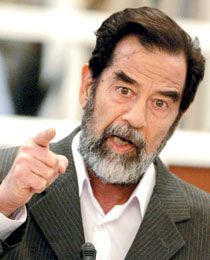BAGHDAD, 20 October 2005 — A defiant Saddam Hussein pleaded not guilty to charges of murder and torture as his long-awaited trial began yesterday with the one-time dictator arguing about the legitimacy of the court and scuffling with guards. The first session of the trial lasted about three hours, and the judge ordered an adjournment until Nov. 28.
Saddam and his seven co-defendants could face the death penalty if convicted for the 1982 massacre of nearly 150 Shiites in the town of Dujail. They are being tried in the former headquarters of Saddam’s Baath party.
At the trial’s opening, the ousted Iraqi leader — looking thin with a salt-and-pepper beard in a dark gray suit and open-collared white shirt — stood and asked presiding Judge Rizgar Mohammed Amin, a Kurd: “Who are you? I want to know who you are.”
“I do not respond to this so-called court, with all due respect to its people, and I retain my constitutional right as the president of Iraq,” he said, brushing off Amin’s attempts to interrupt him. “Neither do I recognize the body that has designated and authorized you, nor the aggression because all that has been built on false basis is false.” Amin tried to get Saddam to formally identify himself but Saddam refused and finally sat. Amin read his name for him, calling him the “former president of Iraq,” bringing a protest from Saddam, who insisted he was still in the post.
Later, Amin read the defendants their rights and then read the charges, which are the same for all, and told them they face possible execution if convicted. Saddam sat slumped low in his chair and occasionally wrote notes on a yellow pad throughout the hearing.
Amin then asked each for their plea. He started with the 68-year-old ousted dictator, saying “Mr. Saddam, go ahead. Are you guilty or innocent?” Saddam — holding a copy of the Qur’an he brought with him into the session and held throughout — replied quietly, “I said what I said. I am not guilty,” referring to his arguments earlier in the session.
Amin read out the plea, “Innocent.”
The confrontation then became physical. When a break was called, Saddam stood, smiling, and asked to step out of the room. When two guards tried to grab his arms to escort him out, he angrily shook them off. Saddam and the guards shoved each other and yelled for about a minute.
In the end, Saddam was allowed to walk independently, with the two guards behind him, out of the room for the break.
The Dujail trial is the first of around a dozen cases prosecutors intend to bring against Saddam and members of his inner circle in an attempt to bring accounting for a 23-year regime that saw tens of thousands of its own people killed and imprisoned. Other cases include his regime’s Anfal Offensive that killed some 180,000 Kurds, a poison gas attack on the town of Halabja that killed 5,000 and a crackdown on rebellious Shiites and Kurds in 1991. The five-judge panel will both hear the case and render a verdict against Saddam and the other defendants.
Many Iraqis and others across the Middle East were glued to their television sets to watch the first-ever criminal trial of an Arab leader. The camera did not show four of the five judges, whose identities have been kept secret, focusing instead on Amin, the Kurdish chief judge whose name was announced only just before the trial.
The chief prosecutor, Jaafar Al-Mousawi, then outlined the case against the men. Afterward, Saddam’s lawyer, Khalil Al-Dulaimi, asked for the names of the witnesses who will testify for the prosecution — names that have been kept strictly secret to prevent reprisals against them. Amin said Al-Dulaimi could ask the prosecutors for the names but did not say if he would order them handed over.
Saddam and his fellow defendants were seated in three rows inside a pen made of white iron slats.
Starting the session, Amin called in the defendants one by one. Saddam was the last to enter, escorted by two Iraqi guards in bulletproof vests guiding him by the elbow. He glanced at journalists watching through bulletproof glass from an adjoining room. He motioned for his escorts to slow down a little.
The other defendants include Saddam’s former intelligence chief Barazan Ibrahim, former Vice President Taha Yassin Ramadan and other lower-level Baathist civil servants. Most were wearing traditional Arab robes and complained they were not allowed to have headdresses, so court officials brought out red headdresses for them.
Meanwhile, insurgents killed 26 people yesterday, including six Shiites who were lined up at a factory and gunned down in front of their fellow workers, police said.
In two other deadly attacks, six civilians were killed when mortar rounds hit their homes in Samarra, 95 kilometers north of Baghdad, and three election commission officials were shot and killed on the outskirts of the capital in Abu Ghraib, as they drove home after another round of counting ballots from the constitutional referendum, police said.
In Washington, US Secretary of State Condoleezza Rice heralded the constitutional referendum and said the American strategy in Iraq was to “clear areas from insurgent control, hold them securely, and build durable, national Iraqi institutions.”
Rice told the US Senate Foreign Relations Committee the United States is working to dismantle the insurgent network and disrupt foreign support for them, maintain security in areas insurgents no longer hold, and build national institutions to “sustain security forces, bring rule of law, visibly deliver essential services, and offer the Iraqi people hope for a better economic future.”
— With input from agencies










